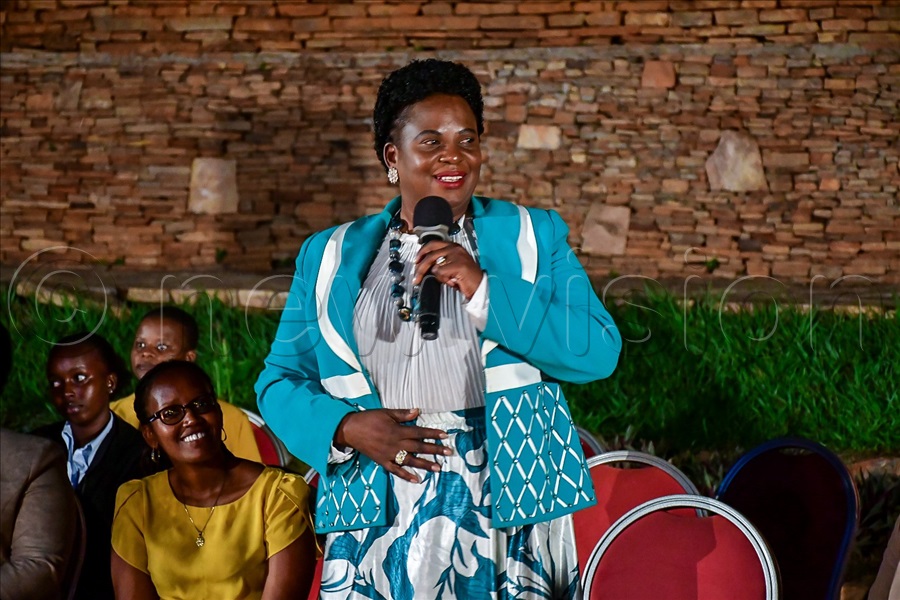Young female politicians urged to build networks, defy gender bias
Many young women recounted harrowing experiences of sexual harassment, gender stereotypes, and intense financial demands as key deterrents to political participation.
The fire camp which attracted hundreds of young female politicians was held at Ndere Cultural Center in Kampala on March 27, 2025. (Credit: John Musenze)
John Musenze
Journalist @New Vision
KAMPALA - Despite the growing number of young women interested in political leadership, deep-rooted gender biases, financial constraints, sexual harassment, and societal expectations continue to stifle their ambitions.
This was the central theme at the Fire Camp for young female politicians from all political parties held at Ndere Cultural Centre on 27th March 2025, where aspiring leaders engaged in candid discussions with seasoned politicians on navigating the turbulent waters of Uganda’s political landscape.
The Fire Camp, organised by the Netherlands Institute for Multiparty Democracy (NIMD) and the Parliamentary Forum on Youth, provided a platform for young women to share their experiences and seek solutions to the obstacles barring them from active participation in politics.
The chief guest, who was the Minister of Gender, Labour, and Social Development, Betty Amongi remarks. (Credit: John Musenze)
The chief guest, who was the Minister of Gender, Labour, and Social Development, Betty Amongi, challenged the attendees to remain steadfast in their ambitions, emphasising that:
"Politics is not about age. It’s about knowing the issues that affect your people and having the courage to address them."
Many young women recounted harrowing experiences of sexual harassment, gender stereotypes, and intense financial demands as key deterrents to political participation.
One attendee, Vivian Kabasinga from the National Youth Council in Kayunga, noted:
"It’s hard to engage in an election that requires 500 million rupees or more. Many of us have the vision, but the financial burden is crippling."
Similarly, Esther Nankya, the Vice Chairperson of the National Youth Council, pointed out the entrenched cultural biases: "In some societies, women are not allowed to participate or lead. It is usually men who are seen as leaders."

At the Fire Camp for young female politicians from all political parties, aspiring leaders engaged in candid discussions with seasoned politicians. (Credit: John Musenze)
Another aspiring politician voiced her frustration: "I want to stand against the Speaker of Parliament in Bukedea district, but just mentioning it feels like a crime."
Sexual exploitation within political structures was also a major concern. One participant revealed:
"Most men want to sleep with us, especially in political parties, in exchange for connections, party cards, or financial assistance. Even some voters demand favours."
Cultural and religious expectations further discourage women from entering the political arena. Leadership is still largely viewed as a male domain in many societies.
One participant lamented: "Where I come from, a woman who speaks boldly in public is considered disrespectful. How, then, do we lead?"
Beyond external barriers, female politicians are often judged harshly on their personal lives. Some experienced politicians shared their struggles, including losing their marriages due to their political careers.

Atukwatse Primus Bahiigi, Country Director of the Netherlands Institute for Multiparty Democracy, called on women to understand their role and take up the mantle. (Credit: John Musenze)
Judith Peace Achan, Woman MP for Nwoya, pointed out: "A divorced woman in politics is often labelled as immoral. Men in the same position do not face the same scrutiny."
Amid these struggles, the conversation focused on strategies to empower young women to persist despite the odds.
Minister Amongi advised aspiring politicians to surround themselves with a strong support system: "First, have people you rely on—people who believe in you. The right networks can help you navigate the political space without carrying the entire burden alone."
Seasoned politicians at the event echoed this sentiment, urging young women to actively seek mentorship.
They stressed that politics should not be viewed as a battlefield of survival but rather as a space where women, regardless of their backgrounds, can contribute meaningfully to governance.
One speaker emphasised the need for a shift in mindset: "Ugandans need to understand that politics is about solving issues, not fighting each other. Differences in ideology should not divide us."

Women from all political parties attended the fire camp. (Credit: John Musenze)
Flavia Nabagabe, Woman MP for Kasanda, reinforced the importance of strong networks: "Young women need the right networks to support their causes, dreams, and aspirations. If you have the right network, the burden doesn’t fall solely on you." Nabagabe advised.
In his speech, Atukwatse Primus Bahiigi, Country Director of the Netherlands Institute for Multiparty Democracy, called on women to understand their role and take up the mantle: "If you are a woman who is educated and interested in leadership, look for any position and start breaking barriers from that point. Focus on male-dominated positions and change the narrative." Bahiigi highlighted.
He further challenged women to recognise their power: "Women are the strongest pillars of the world. Do you know your power, and do you believe in this power?" Bahiigi emphasised.
As Uganda approaches the 2026 general elections, the event organisers emphasised the importance of sustained engagement. The Fireplace Conversation, they noted, is only the beginning of a broader effort to strengthen young women's political participation.
By bridging the gap between generations and fostering conversations that challenge the status quo, such platforms can help accelerate action against barriers to young women’s political participation.
Minister Amongi closed the event with a powerful call to action, urging the women to find issues they are passionate about and engage with local communities to understand their needs: "When contesting for a national position, look beyond your region or political party. Seek support from those outside your immediate circle."
She concluded with a resounding message: "Defend your decision to join politics. Stand firm, build networks, and always remember—the issue is not whether you are young or old, but whether you can speak for your people and bring change." Amongi noted.
Comments
No Comment